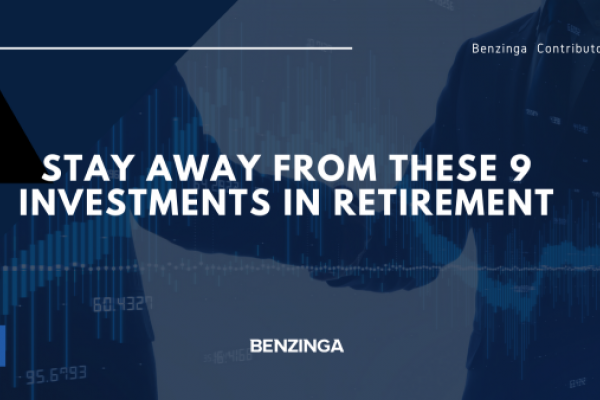Step Away From These 9 Retirement Investments
By Bob Ciura
Investors nearing retirement have different needs than investors with many more years in the workforce. Retiring means losing regular wages from work and therefore replacing that income is a key consideration. There are many investments that appeal to retirement investors. But there are also many investments that retirement investors should avoid.
#1: Money
"Cash is king" is a well-known phrase, but when it comes to investing in retirement, cash is not king. Cash should be avoided by retirement investors as it yields no return. Unlike bonds that pay interest or stocks that pay dividends, cash does not earn interest. Therefore, cash loses value over time due to the constant erosion of inflation.
While retirees have a number of pressing challenges to paying their expenses without a paycheck, keeping lots of cash aside isn't the best idea. Ideally, retirees can generate enough income from their investments, in combination with other sources of income such as social security, that they do not need to hold a large sum of money.
#2: High Yield Bonds
Sometimes called junk bonds, high yield bonds are fixed income securities issued by companies with a credit rating below investment grade.
With interest rates still near historic lows, fixed income yields have plunged in recent years. For example, the 10-year Treasury is only yielding 1.3% right now. With inflation well above this level, retirees will see their purchasing power eroded with low-yielding bonds.
For this reason, high yield bonds are attractive because of their higher yields. But investors can aim for considerably high risk in their search for yield. Bonds with a credit rating below investment grade have a higher probability of default.
#3: Cryptocurrencies
Cryptocurrencies like Bitcoin BTC/USD are all the rage these days. The massive increase in value of bitcoin and other cryptocurrencies over the past few years is attractive to any investor. And cryptocurrency is widely covered in the financial media.
But retirees should remember that volatility is a two-way street. Bitcoin price is down nearly 50% from its 52-week high, a reminder that any investment can lose value. Bitcoin also does not pay interest or dividends, which means investors will not generate income from their investment. And another reason retirees should avoid Bitcoin is simply the higher level of risk involved in buying cryptocurrencies, not to mention the tax implications.
Learn more: Why is Dodgecoin crashing today?
#4: Oil and Gas Royalty Trusts
Oil and gas royalty trusts are niche securities within the stock market. These are companies that own oil and gas producing properties. Investors receive distributions based on the income the trusts generate from these properties. Some well-known oil and gas royalty trusts include BP Prudhoe Bay Royalty Trust (BPH) and Permian Basin Royalty Trust (PBT).
As with any group, not all royalty trusts are bad investments. But the risks are high across the board – royalty trusts are essentially a bet on underlying commodity prices. Investors also have to deal with the prospect that reserves will decline faster than the trust originally expected. There are also oil ETFs that retirees might consider, but these should only be a small part of a retirement portfolio.
If oil and gas prices fall, royalty trust stock prices plummet and their distributions shrink, often to zero, as happened in 2020 during the coronavirus pandemic.
#5: Mortgage REITs
Real Estate Investment Trusts, also known as REITs, are a great way for retirees to earn higher investment income. Many REITs have high yields of 4% or more. ...

By Bob Ciura
Investors nearing retirement have different needs than investors with many more years in the workforce. Retiring means losing regular wages from work and therefore replacing that income is a key consideration. There are many investments that appeal to retirement investors. But there are also many investments that retirement investors should avoid.
#1: Money
"Cash is king" is a well-known phrase, but when it comes to investing in retirement, cash is not king. Cash should be avoided by retirement investors as it yields no return. Unlike bonds that pay interest or stocks that pay dividends, cash does not earn interest. Therefore, cash loses value over time due to the constant erosion of inflation.
While retirees have a number of pressing challenges to paying their expenses without a paycheck, keeping lots of cash aside isn't the best idea. Ideally, retirees can generate enough income from their investments, in combination with other sources of income such as social security, that they do not need to hold a large sum of money.
#2: High Yield Bonds
Sometimes called junk bonds, high yield bonds are fixed income securities issued by companies with a credit rating below investment grade.
With interest rates still near historic lows, fixed income yields have plunged in recent years. For example, the 10-year Treasury is only yielding 1.3% right now. With inflation well above this level, retirees will see their purchasing power eroded with low-yielding bonds.
For this reason, high yield bonds are attractive because of their higher yields. But investors can aim for considerably high risk in their search for yield. Bonds with a credit rating below investment grade have a higher probability of default.
#3: Cryptocurrencies
Cryptocurrencies like Bitcoin BTC/USD are all the rage these days. The massive increase in value of bitcoin and other cryptocurrencies over the past few years is attractive to any investor. And cryptocurrency is widely covered in the financial media.
But retirees should remember that volatility is a two-way street. Bitcoin price is down nearly 50% from its 52-week high, a reminder that any investment can lose value. Bitcoin also does not pay interest or dividends, which means investors will not generate income from their investment. And another reason retirees should avoid Bitcoin is simply the higher level of risk involved in buying cryptocurrencies, not to mention the tax implications.
Learn more: Why is Dodgecoin crashing today?
#4: Oil and Gas Royalty Trusts
Oil and gas royalty trusts are niche securities within the stock market. These are companies that own oil and gas producing properties. Investors receive distributions based on the income the trusts generate from these properties. Some well-known oil and gas royalty trusts include BP Prudhoe Bay Royalty Trust (BPH) and Permian Basin Royalty Trust (PBT).
As with any group, not all royalty trusts are bad investments. But the risks are high across the board – royalty trusts are essentially a bet on underlying commodity prices. Investors also have to deal with the prospect that reserves will decline faster than the trust originally expected. There are also oil ETFs that retirees might consider, but these should only be a small part of a retirement portfolio.
If oil and gas prices fall, royalty trust stock prices plummet and their distributions shrink, often to zero, as happened in 2020 during the coronavirus pandemic.
#5: Mortgage REITs
Real Estate Investment Trusts, also known as REITs, are a great way for retirees to earn higher investment income. Many REITs have high yields of 4% or more. ...
What's Your Reaction?






















